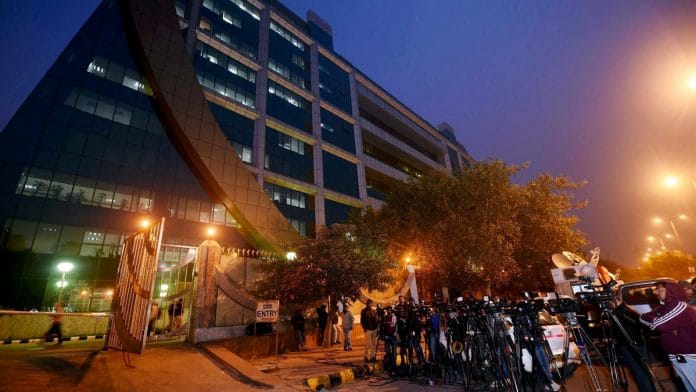Kolkata: More than 100 charge sheets, 210 arrests, 35 convictions — but five years after the CBI took over the probes into the chit fund scams that rocked West Bengal in 2013, the agency has failed to close a single case.
Instead, the investigation has sparked a state police vs CBI war apart from taking the Mamata Banerjee-Narendra Modi government relations to a new low.
In its latest action, the CBI summoned former Kolkata police commissioner Rajeev Kumar last week with respect to money collection schemes run by the Rose Valley Group. The summons came even as Kumar has long been submitting petitions before the Calcutta High Court seeking an extension of protection against arrest in the high-profile Saradha chit fund scam case.
“The case has gone too far. Now it looks like a witch-hunt,” said a senior police officer on the condition of anonymity. “In between 2014 and 2016, there was no development in the case. Things started picking up two years before the general elections,” the officer added.
“It has almost become a steady and standard weapon for the ruling party at the Centre to use against the ruling party in the state every year.”
Some experts called this five-year-long investigation “unprofessional” on the part of the CBI.
“I fail to understand why the CBI is calling the same person repeatedly. The investigators need to be well-prepared before summoning influential people such as MPs, ministers and bureaucrats,” Upen Biswas, the former CBI joint director, and now a Trinamool Congress leader told The Print.
According to him, influential people will not willingly confess to their crimes and investigators need to keep building the pressure through evidence.
“Officers who were investigating the case were transferred quickly and it took a toll on the probe,” said Biswas, who led the fodder-scam investigation in Bihar against then CM Lalu Prasad Yadav.
A senior CBI official defended the charges against the agency, saying that the magnitude of the scam was huge.
“The scam is spread across five states in the eastern India — Bengal, Bihar, Jharkhand, Assam and Odisha,” he said. “Hundreds of such fraudulent companies are involved and we have thousands of investors complaining to us.”
The official also denied charges that the agency was acting on a political agenda. “As far as grilling of people is concerned, that we will keep doing as and when we get evidence against them,” he said.
Also read: CBI summons Partha Chatterjee & Rajeev Kumar as it investigates Saradha, Rose Valley scams
Multiple Ponzi schemes
The chit fund and money deposit scheme scams came to light in 2013, two years after Banerjee came to power in West Bengal. The first to go bankrupt and fail its payment commitments was the Saradha Group and its multiple companies through which it was collecting money. The group went bust in April 2013 as thousands of small depositors lost their investments in these companies.
This started a chain reaction as different unregulated money collection companies such as the Rose Valley Group, iCore, MPS Group, The Tower Group and so on started defaulting on their dues and began closing down one after another.
The Supreme Court handed the investigation to the CBI in 2014.
As the CBI investigation unfolded, a number of Trinamool politicians began falling into the agency’s net.
Among the first to be arrested in 2014 was Banerjee’s cabinet colleague Madan Mitra, who was then the state’s transport minister. Mitra was one of the most powerful and influential ministers in Banerjee’s cabinet but he was in jail for almost 11 months before he secured bail.
Trinamool MPs — Srinjay Bose (in 2014), Tapas Pal (in 2015) and Sudip Bandyopadhyay (in 2017) — were all arrested before they too secured bail. The CBI also picked up Matang Singh, a Congress leader from Assam and a former union minister, in connection with the Saradha scam in 2015.
Allegations of political vendetta
The CBI’s actions, however, drew allegations of political vendetta by the Trinamool Congress, which has lost ground to the BJP in the state.
The allegations have intensified as in recent times, the CBI investigation has not spared Mamata’s close aides. The Trinamool parliamentary party leader in the Rajya Sabha, Derek O’Brien, appeared before the CBI on 9 August. He was called in connection with his association with the party’s mouthpiece, Jaago Bangla. The CBI is probing the source of funds for the mouthpiece.
It was in this connection that the paper’s editor and state education minister Partha Chatterjee was also summoned by the CBI last week. To make matters worse, proceeds received by the party from the sale of the chief minister’s paintings are also being looked into.
The CBI investigation has also not spared the bureaucracy in Bengal. The state’s former home secretary Atri Bhattacharya has been summoned in the Saradha case. He is currently the principal secretary of the state’s tourism department, a demotion from his previous posting as the home secretary.
Earlier, at least three senior officials of the additional director general rank and a former director-general of police were also grilled by the central agencies, including the CBI and the Enforcement Directorate. The ED is probing into the money trail in the scam.
Also read: How Prashant Kishor is giving a makeover to Brand Mamata and her Trinamool Congress







This may not be a coincidence. There are fewer business opportunities in these states, for funds to be invested profitably. This was also a period of high inflation, negative real interest rates, a lot of middle class families would have been tempted by the high returns promised and delivered in the early phase of each scheme. There is a need for the RBI and other regulatory authorities to squeeze these essentially fraudulent schemes out of the market.